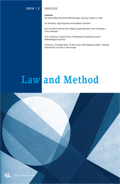|
Contemporary critical analyses of legal education indicate that legal education is undemocratic as it is based on a discipline that produces subjects who obey hierarchies, are free from the habit of criticism and are ready to self-sacrifice for promotion in the social hierarchy. At the same time, critical analyses offer the very passive vision of the law student as merely ‘being processed’ through the educational grinder. Paradoxically, in doing so they confirm the vision they criticize. This article argues that, by adopting a pragmatic philosophical perspective, it is possible to go beyond this one-sided picture. Over the past few decades, there has been an increase in ‘practical’ attitudes in legal education. Socrates’ model of didactics, clinical education and moot courts are giving rise to institutionalized ideas as structural elements of legal education, owing to which a purely disciplinary pedagogy may be superseded. All these practices allow students to accept and confront the viewpoints of others. Education completed in harmony with these ideas promotes an active, critical member of community, who is ready to advance justified moral judgements, and as such is compliant with pragmatic ethics of democracy. |


Law and Method
About this journalSubscribe to the email alerts for this journal here to receive notifications when a new issue is at your disposal.
| Artikel |
|
| Keywords | legal education, democracy, pragmatism |
| Authors | Michal Stambulski |
| AbstractAuthor's information |
| Redactioneel |
|
| Keywords | professional ethics |
| Authors | Emanuel van Dongen and Jet Tigchelaar |
| AbstractAuthor's information |
|
The theme of the special issue of Law and Method on Education in (Professional) Legal Ethics consists both of content-related as well as didactical-oriented contributions, of which most are written in the Dutch language and two are written in the English language. The content-related approaches show that in education in legal ethics use can be made of professional standards, constitutional principles as well as general ethical theories (such as utilitarianism, deontology, and virtue ethics). Because lawyers work with ‘the law’, broader or narrower conceptions of law (in relation to morality) also affect legal reasoning and are therefore relevant to education in professional legal ethics. However, these approaches are also put into perspective: the leap forward from moral reasoning based on abstract core values and ethical principles to morally correct action in concrete moral dilemmas in legal practice is a large one. Several solutions are proposed: I. teach ethics indirectly, stressing the importance of facts and of professional role consciousness, and of the importance of formal and informal respect for all concerned, as an essential part of the professional lawyers’ role (Kaptein – written in English); II. use insights from social psychology to overcome barriers to actual ethical behaviour (Becker and Mackor); III. use dialogues about case studies that demonstrate different aspects of judicial ethics for judges (Brenninkmeijer&Bish – written in English) or IV. give (to future governmental lawyers) context-sensitive bottom-up moral dilemmas to enhance realism, alertness and role resistance against opposing forces (Van Lochem). A relevant theme in the didactical approaches to legal ethics is the absence or limited practical professional experience law students have, so that, for example, conversation techniques based on personal experience have limited value. At university level, this can be remedied to some extent by reinforcing one’s own experience, i.e. experiential learning, or by bringing the experiences of others into the classroom, for example with guest lecturers from the field, or by telling and discussing fictional or true stories (Van Dongen & Tigchelaar). Education at university gives a good starting point for (professional) legal ethics, followed by post-academic legal ethics education and legal practice as lifelong learning school. A contribution with a focus on the notary (Waaijer) highlights the different approaches within this continuum. |

 Issue 12
Issue 12